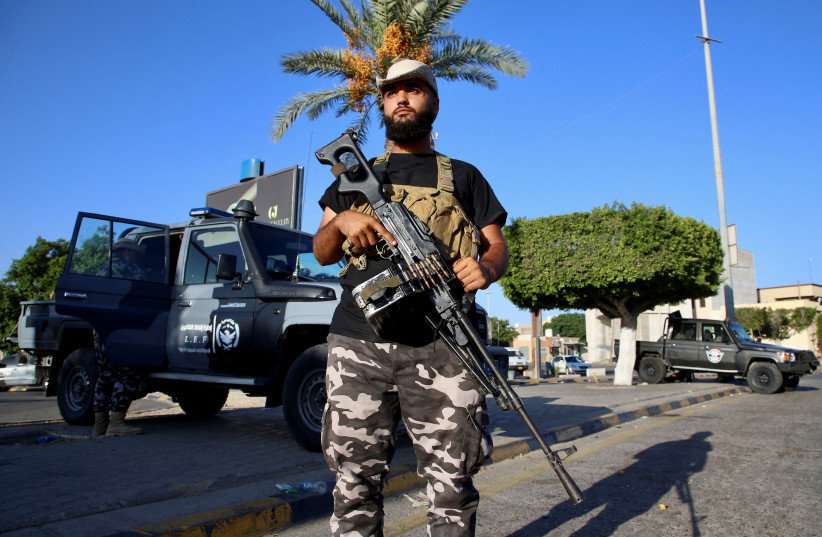Libyan foreign minister fired after meeting with Israel, fleeing country
Libyan Foreign Minister Najla Mangoush was fired on Monday, a Libyan government source told Reuters, after Foreign Minister Eli Cohen said Sunday that he had met her last week in Rome, even though the countries lack formal relations.
The initial suspension notice was signed by Prime Minister Abdulhamid al-Dbeibah, who heads Libya’s Government of National Unity. According to media reports, Mangoush left Libya for Turkey early this morning.
Israel said the face-to-face conversation facilitated by Italian Foreign Minister Antonio Tajani had been pre-arranged and lasted for over an hour and included a discussion on cooperation in a wide array of arenas including agriculture and water technology.
Israel’s Foreign Ministry said Libyan officials at the highest level had known. of the meeting and that the release of the information to the media had been coordinated with Libya. The report of the meeting sparked anger on the Libyan streets, prompting protests, including against the Foreign Ministry building there.
Libya’s Foreign Ministry said Mangoush had refused a proposed meeting with Israeli representatives and that what had occurred was “an unprepared, casual encounter during a meeting at Italy’s Foreign Affairs Ministry.”
It stressed that the interaction did not include “any discussions, agreements or consultations” and added the ministry “renews its complete and absolute rejection of normalization” with Israel.
 A member of the Security personnel affiliated with the Ministry of Interior secures the street after yesterday’s clashes between armed factions in Tripoli, Libya, August 16, 2023. (credit: REUTERS/HAZEM AHMED)
A member of the Security personnel affiliated with the Ministry of Interior secures the street after yesterday’s clashes between armed factions in Tripoli, Libya, August 16, 2023. (credit: REUTERS/HAZEM AHMED)The Foreign Ministry also issued a statement stressing its support for the Palestinians and affirming Jerusalem’s status as the capital of a Palestinian state.
The Presidency Council, which functions as head of state, issued a statement on Sunday asking GNU Prime Minister Abdulhamid al-Dbeibah for clarification on what had taken place.
The High State Council, which holds an advisory role in Libyan politics, voiced its “surprise” at the reports of the meeting and said those responsible “should be held accountable.”
Cohen who published details of last week’s meeting with Mangoush on Sunday touted the “historic” nature of the meeting, explaining that it was “the first step in [building] the relationship between Israel and Libya.” He placed it within the context of Israel’s effort to forge new diplomatic relations with countries.
“We are working with a series of countries in the Middle East, Africa, and Asia with the aim of expanding Israel’s circle of peace and normalization,” Cohen stated.
On the Mediterranean coast, Libya is the fourth largest country on the African continent, with a population of some six million. In the past year, it produced about 1.2 million barrels of oil a day.
Jewish history in that country dates back as far as the time of King Solomon, but the Jewish community was decimated in modern times as its members fled persecution, particularly in the second half of the 20th century.
“Libya’s size and strategic location provide vast value and enormous potential for the State of Israel,” Cohen said. “I spoke with the foreign minister about the great potential relations between the two countries would bear, as well as the importance of preserving the heritage of Libyan Jewry, which includes renovating synagogues and Jewish cemeteries in the country,” Cohen said.
The two foreign ministers also discussed cooperation in agriculture and water technology.
Past communications between Libya and Israel
While this is the first time that an Israeli-Libyan meeting has occurred at the foreign ministerial level, it is not the first time that high-level Israeli and Libyan officials have reportedly spoken.
There were reports in January 2022 that Mossad Director David Barnea and Dabaiba met in Jordan to discuss normalization and security cooperation. Although the meeting was publicized by Saudi Arabian and Libyan media outlets, Dabaiba later denied the meeting.
Separately that same month, a plane belonging to the commander of the Libyan National Army, Khalifa Haftar, reportedly landed in Israel from Cyprus and then left.
Libyan foreign policy is complicated by its years of conflict and its bitter internal divisions over control of government and the legitimacy of any moves made by the Tripoli administration.
The Government of National Unity was installed in early 2021 through a U.N.-backed peace process but its legitimacy has been challenged since early 2022 by the eastern-based parliament after a failed attempt to hold an election.
Previous foreign policy moves by the GNU, including agreements it has reached with Turkey, have been rejected by the parliament and subjected to legal challenges.
Jerusalem Post Staff contributed to this report.





Comments are closed.